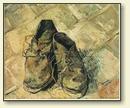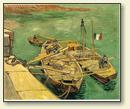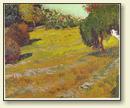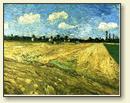| Relevant paintings: 
"Marcalle Roulin," Van Gogh 1888
[Enlarge]

"Portrait of the Artist's Mother," Vincent van Gogh
[Enlarge]

"Old Pair of Shoes," Vincent van Gogh
[Enlarge]

"Quay with Men Unloading Sand Barges," Vincent van Gogh
[Enlarge]

"Public Park with Weeping Willow: The Poet's Garden I," Vincent van Gogh
[Enlarge]

"Newly mown lawn with weeping tree," Vincent van Gogh
[Enlarge]

"Sunny Lawn in a Public Park," Vincent van Gogh
[Enlarge]

"Starry Night over the Rhone," Vincent van Gogh
[Enlarge]

"The Green Vineyard," Vincent van Gogh
[Enlarge]

"Ploughed Field," Vincent van Gogh
[Enlarge]

"Vincent's House in Arles (The Yellow House)," Vincent van Gogh
[Enlarge]
|
Highlighting psychology - neurological - Turn off highlighting
My dear comrade Bernard,
This time you deserve higher praise for the little sketch of
the two Breton women in your letter than for the other six,
because the little one has great style. I myself am behindhand
with the sketches, for during the present superbly fine days I
have been completely absorbed in square size 30 canvases which
exhaust me considerably, and which I shall use to decorate the
house. You will have received my letter in which I explained my
serious reasons for advising you to try to persuade your
father, if he pays your fare to Arles, to give you a little
more latitude in the matter of finances.
I believe you will pay him back with your work, and in this
way you would be in Gauguin's company longer; and then, when
you leave to do your military service, you would set out on a
fine artistic campaign. If your father had a son who sought and
found unrefined gold in the pebbles and on the sidewalks, he
would certainly not despise that talent. Now in my opinion your
talent is absolutely equivalent to that.
Though your father might regret that it is not quite new and
shining gold, coined into louis d'or, yet he would decide to
make a collection of these finds, and would not part with them
except for a reasonable price.
He ought to do the same thing with your pictures and
drawings, which are, commercially speaking, as rare and
valuable as precious stones and rare metals. And that is
absolutely true.
Painting a picture is as difficult as finding a large or a
small diamond. Now, however, whereas everybody recognizes the
value of a louis d'or or a pure pearl, those who cherish
pictures and believe in them are unfortunately rare. But they
exist nonetheless.
In any ease one cannot do better than wait without losing
patience, even if one should have to wait a very long time.
As for you, just think over what I told you about the cost
of living here, and whether you would really like to come to
Arles to join Gauguin and me. Tell your father emphatically
that with a little more money you would paint much better
pictures.
It will be a finer thing if all this crystallizes naturally;
the more one talks about it the less it will happen. If you
want to help it onward, you will only have to go on working
with Gauguin and me. This is in progress, so don't let's talk
about it. If it is to come about, it will happen without prolix
discussions but as the result of calm, well-thought-out
actions.
As for exchanges, it is just because I observe that in the
[i.e. your and Gauguin's] letters such frequent mention is made
of Laval, Moret and the other young man that I am anxious to
make their acquaintance. But I don't have five dry studies; I
shall have to add at least two attempts at pictures a little
more serious: a self-portrait and a landscape during the fury
of an evil-minded mistral.
Moreover I should have a study of a little garden with
multicolored flowers, a study of grey and dusty thistles, and
finally a still life of a peasant's old boots, last of all
a little landscape of nothing at all, in which there is only a little expanse. If
these studies are not to their liking, if one or the other
would rather not have them, then the only thing to do is to
keep those for which they want to make an exchange, and to send
back the others together with the exchanges. There is no hurry,
and when making exchanges it is better for each to try to give
something good.
If, when it is exposed tomorrow to the sun, it gets
sufficiently dry to be rolled up, I shall add a landscape of
“Men Unloading Sand,” also a project for and an
attempt at a picture, in which there is a more mature
purposefulness.
I cannot send a replica of the “Night
Café” yet because it has not even been begun, but
I shall be delighted to do one for you.
Once more, it is preferable for each of us to try to
exchange good things, rather than do them in too great a
hurry.
The artistic gentleman in the letter, 1 who looks
like me - is it me or somebody else? - as far as the face is
concerned it would really seem to be me, but in the first place
I am always smoking a pipe, and then I have always had an
unutterable horror of sitting like that on precipitous cliffs
verging on the sea, as I suffer from vertigo. So if that is
meant to be my portrait, I protest against the aforementioned
improbabilities.
1 am terribly absorbed in decorating my house; I dare
believe it will be rather to your taste, although it is
certainly very different from what you do. But at the time, you
spoke to me about pictures, one representing flowers, another
trees, another fields. Well, I myself have the “Poet's
Garden” (2 canvases; among the sketches you have there is
the first conception of it, done after a smaller study that is
already at my brother's). Then the “Starry Night,”
further the “Vineyard,” then the “`Furrows,”
then the view of the house, which might be called “The
Street.” So that there is a certain unintentional
consecutiveness.
Well, I am very curious to see the studies of Pont-Aven.
But, as for you, please give me something a little elaborate.
Anyhow, it is sure to be all right, because I like your talent
so much that I greatly want to make a little collection of your
works, bit by bit.
Sincerely yours, Vincent
-
Allusion to a caricature by Gauguin representing
Vincent, seated on the top of a cliff, busy painting the
sun.
At this time, Vincent was 35 year oldSource:
Vincent van Gogh. Letter to Emile Bernard. Written 6 October 1888 in Arles. Translated by Mrs. Johanna van Gogh-Bonger, edited by Robert Harrison, number B18.
URL: https://www.webexhibits.org/vangogh/letter/18/B18.htm.
This letter may be freely used, in accordance with the terms of this site.
|